09届高三英语高考一轮复习模块4
- 格式:doc
- 大小:79.50 KB
- 文档页数:7
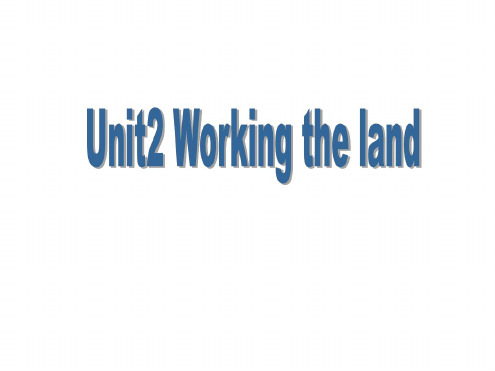
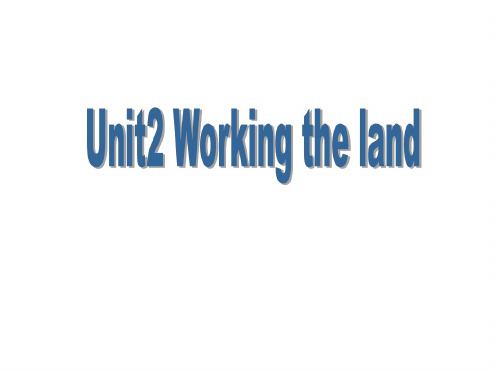
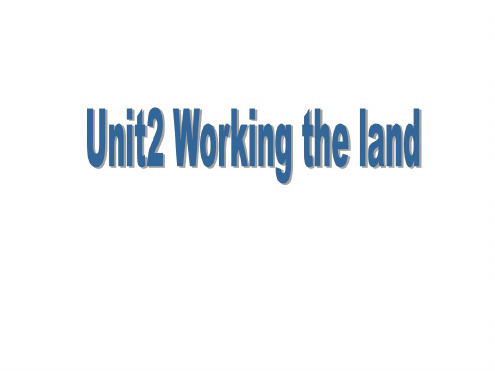
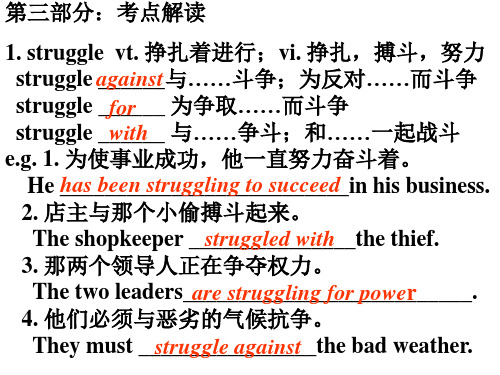
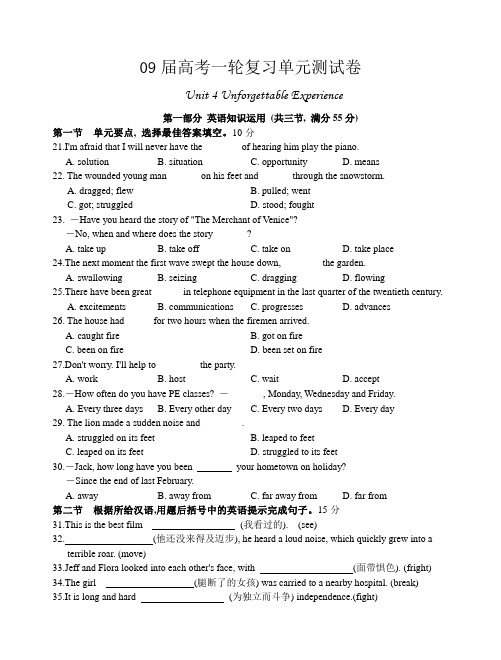
09届高考一轮复习单元测试卷Unit 4 Unforgettable Experience第一部分英语知识运用(共三节, 满分55分)第一节单元要点, 选择最佳答案填空。
10分21.I'm afraid that I will never have the _______ of hearing him play the piano.A. solutionB. situationC. opportunityD. means22. The wounded young man ______ on his feet and ______ through the snowstorm.A. dragged; flewB. pulled; wentC. got; struggledD. stood; fought23. -Have you heard the story of "The Merchant of Venice"?-No, when and where does the story_______?A. take upB. take offC. take onD. take place24.The next moment the first wave swept the house down,________ the garden.A. swallowingB. seizingC. draggingD. flowing25.There have been great ______in telephone equipment in the last quarter of the twentieth century.A. excitementsB. communicationsC. progressesD. advances26. The house had _____ for two hours when the firemen arrived.A. caught fireB. got on fireC. been on fireD. been set on fire27.Don't worry. I'll help to ________ the party.A. workB. hostC. waitD. accept28.-How often do you have PE classes? -_______, Monday, Wednesday and Friday.A. Every three daysB. Every other dayC. Every two daysD. Every day29. The lion made a sudden noise and ________.A. struggled on its feetB. leaped to feetC. leaped on its feetD. struggled to its feet30.-Jack, how long have you been your hometown on holiday?-Since the end of last February.A. awayB. away fromC. far away fromD. far from第二节根据所给汉语,用题后括号中的英语提示完成句子。
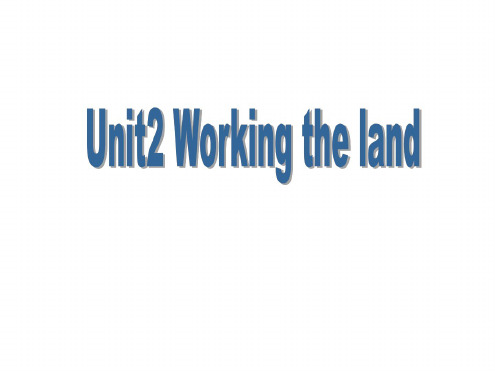
〖Unit 5 Inside advertising〗之小船创作Teaching aims and demandsPeriod 1Warming upStep 1 PresentationEnjoy some advertisements.Step 2 DiscussionDivide the students into several groups and discussthe questions in Warming up.Step 3 Understand some ads.Look at the ads at page 42 and 43 carefully and finish the Comprehending Exercise 2. Exercise 2 is very important as it develops students’ ability to look critically at advertisements. Make sure students have enough time to discuss these questions fully. Ask them to work in groups and then discuss their answers with the whole class.1.WaterA. What is the most common name for H2O? Why did they call it H2O?Water. Because it rhymes with “slow”.B. What is the purpose of this advertisement?To encourage people to use water wisely and to save water where they can.2. Super ShoozeA. What group of people is the advertisement madefor?Young people who like sports, the latest fashions and like to be part of a group.B. What message does the advertisement give?If you wear our shoes you’ll have an exciting life, and be popular and have fun.C. Do you think the message is true? Give reasons.No, because just wearing a certain brand of shoes won’t make you exciting, popular ofhave fun—it takes much more effort thanthat.3. Refresh waterA.Why are the first two lines written biggerthan the rest of the advertisement?These lines appear bigger to that they are the first thing people notice about the ad.B. The advertisement says that when you buy two,they will give you two more at no extra cost.Does this mean the advertiser will lose moneyon the sales?No.C. Why do advertisers often use the “Buy one get one free” message?People love a bargain, so they are attracted to free offers and are more likely to buy theproduct if they think they are gettingsomething for free.4. EnvironmentA. What does this advertisement encourage youto think?It encourages us to think of the sky, air and our environment and about how the environmentis being spoiled.B. What do you think causes air pollution?Human beings cause air pollution by burningfossil fuels, such as gas, oil, coal, etc byusing some modern machines, transportationvehicles and also by manufacturing modernproducts.C. How else can advertisers make people more aware of our fragile environment?Tell people more and help them to be more aware of the importance of protecting ourenvironment.5. “Speeding” and “How fast am I going”?A. Both of these advertisements have the samepurpose. What do both ads want people to do?They want people to stop speeding.B. Both ads target a certain group of people.Who are they?Drivers.C. If you were a drive, which advertisementwould have most effect on you? Why?Students give their own answers.Step 4 Homework1.Read the passage How Advertising Works.2.Finish Comprehending Exercise 1.Period 2 and 3How Advertising WorksStep 1 Scan the text.Before students read the text, ask them to survey the text by looking at the headings of section. Predict the content.Step 2 Detail readingRead the passage carefully and make an outline.How Advertising Works◆IntroductionWe are exposed to ads in our daily life.1)What kind of ads can we find?2) Where do ads appear?3) Why we need to understand how advertising works?◆What is an ad?1) Definition (a message or announcement that intends to inform or influence people)2) Means (words, pictures, mus ic, film…)3) Advertisers (business, individuals, organizations, associations)◆How do advertisers make effective ads?1) Identify the target (find out necessary information about this group)2) Appeal to the target (hopes, dreams, emotions, desires…)3) Use a suitable medium (cost, media)How effective are ads?1) When there is a need for the product2) If the target audience is exposed to ads constantlyStep 3 Language pointsStep 4 HomeworkMake up an advertisement for a product (including a slogan, the spokesman/spokeswoman and the whole procedure.Period 4Grammar: Object ComplementStep 1 Do Ex. 1 page 46Do the exercise on page 46. Let the students know what can be object complement.Step 2 Explanation宾语补足语是补充宾语的成分,通常置于宾语之后。
2009届高三英语第一轮复习教案附练习(模块六,共4单元)Module 6 Unit 1新课标单词laughter n. 笑,笑声humour n. 幽默comedy n. 喜剧comedian n. 喜剧演员,滑稽演员response n. 回应,反应;问答reaction n. 反应main adj. 主要的physical adj. 形体动作的impressionist adj. 印象模仿的humorous adj. 幽默的,滑稽的queue vi. 排队,列队visual adj. 视觉的actor n. 演员,男演员act vi. 表演academy n. 学院,研究院,学会routine n. 常规,惯例,常规节目,节目live adv.&adj. 现场直播的,生动的little-known adj. 鲜为人知的outstanding adj. 杰出的,显著的improvise vt. 即兴表演,即兴发挥,即兴创作microphone n. 麦克风,话筒lip n. 嘴唇appropriate adj. 适当的,合适的,恰如其分的silent adj. 寂静的;沉默的silent film 无声电影howl vi.&n. 大叫;嚎叫amuse vt. 使愉快,使高兴saying n. 格言,谚语somehow adv. 不知何故vital adj. 至关重要的entertainment n. 娱乐enthusiastic adj. 热心的,热情的tough adj. 辛苦的,累的;粗暴的worthwhile adj. 值得的foreigner n. 外国人initial adj. 最初的,初始的dialogue n. 对话skilled adj. 熟练的skill n. 技能invisible adj. 看不见的,无形的bench n. 长椅,长凳setting n. (戏剧,小说等的)场景courtyard n. 院子shift vi.&vt. 挪动,移动cross vt. 使交叉uncross vt. 使不交叉cosy adj. 舒适的,安逸的annoyed adj. 恼怒的,气恼的wander vi. 漫步crowded adj. 拥挤的entire adj. 整个的,全部的raise vt. 抬高,举起,使上升meaningfully adv. 意味深长地official-looking adj. 貌似官方的bow vi.&n. 鞠躬dash vi. 急奔,急驰,猛冲fool n. 傻瓜,愚蠢的人vt. 愚弄,欺骗tear vt. 撕,扯exit vi. 出去chase vt.&n. 追赶,追逐emergency n. 紧急情况,紧急事件burst vi. 炸破;爆发empty-handed adj. 空手的shrug vt.&vi. 耸肩glare vi. 闪耀,发出眩目的光;怒白而视roll n. 卷,卷形物课文出现短语1. be good for,2. make fun of,3. make jokes about,4. hear sb doing,5. become famous as,6. be famous for,7. broadcast live, 8. make up,9. popular with, 10. popularity with,11. have effect on, 12. stay healthy,13. after all, 14. praise sb for,15. in charge, 16. divide…into,17. take on, 18. be dressed in,19. in response to, 20. queue up,21. soon after, 22. move on, go on,23. burst in, 24. follow in one’s footsteps 25. hold out, 26. tear sth in two,27. be praised for, 28. a roll of,29. for a while, 30. in pairs,31. trip over/on sth 32. point to33. later on in life 34. be broadcast live35. one’s outstanding ability to improvise 36. make sense37. soon after 38. howl with laughter39. go on stage 40. make room41. be made up of 42. be in charge of43. remind sb of sth 44. make a list45. wander over 46. smile on someone47. laugh one’s head off 48. in reference to49. be supposed to do 50. give lessons to sb51. dash out 52. act in a play53. vary from A to B 54. act out a play glare at55. a stack of 56. bump into57. raise one’s eyebrow 58. chase sb off59. say your lines 60. in the most believable way possible61. master the skills一.单词应用根据单词的首字母或汉语意思填写正确单词,注意形式变化。
2009广东英语·高考一轮复习一. 教学内容:一轮知识点Module 2 Unit 2 & 3[学习过程]一、重点单词与短语1. admit vt. & vi.(1)许可某人/物进入This ticket admits two people to the football match.(2)接纳,接受某人(入院入学等)All countries can take part in if their athletes reach the standard to be admitted to the games.Every four years athletes from all over the world are admitted as competitors.He was admitted to hospital with serious burns.(3)承认,招认admit (doing)sth.承认某事/做了某事admit that +从句承认……He never admits that he is wrong.John has admitted that he broke the window. =John has admitted ______________ the window.拓展:admission n.允许加入;承认admission price入场费admittedly = to be honest说实在的考点例题:May I know your age, for people over 40 _________ club.A. don’t admit intoB. aren’t admitted toC. can’t enterD. are refused by2. relate v.将两件事联系起来;有关;涉及It is difficult to relate the cause and effect in the case.relate sth. to /with sth.把……与……联系起来relate to sb./ sth.与……有关;涉及拓展:related adj.有关的;在联系的= relevant adj.relation n.关系,联系,亲戚relative n.亲戚;adj.相对的relativity n.相对性考点例题:用句中黑体字的正确形式填空All his relatives ______________ to the crime have been brought to the police station.3. promise v. &n.(1)允诺;答应promise to do sth.答应做某事promise sb. sth.答应某人某事promise +that 从句答应……make a promise许下诺言keep a promise遵守诺言carry out a promise履行诺言break a promise违背诺言(2)可能The clear sky promise fine weather.注:promising adj.有出息的;有前途的;有希望的考点例题:John went to China last years. And he thinks China is a _________ country.A. promiseB. promisedC. promisingD. promises4. common adj.(1)普通的;通常的common sense常识common people普通老百姓(2)共有的;共同的common property, ownership共有的财产,所有权common interest, purpose共同的兴趣,目的have sth in common with与……有共同之处拓展:commonly adv.通常的;常常的区别:common, ordinary, usualcommon所指事物是最平常的。
它指常发生,并且是“熟悉的,常见的”ordinary“普通的,平凡的”,强调无特殊之处(not special)It was a very ordinary day today.Tom Sawyer was an ordinary American boy who kept getting into trouble.usual常用来指由于长时间没有变化而形成的一种习惯或制度,描写“一贯的,通常”预料所及的事情。
He sat in his usual seat.Are you coming home at the usual time? Yes, I shall leave the office at the same time as usual.5. advantage n.优点;优势;有利条件At the end of an hour’s play the advantage lay definitely with him.拓展:an advantage of sth. is that…其中的一个优点是……an advantage of using solar energy is that it will not pollute the environment.take advantage of 对……加以利用;欺骗to sb.’s advantage 对某人有利have /get/win an advantage over (of)胜过;优于6. arise vi.(arose, arisen)出现;发生arise from /out of由……引起;由……产生A new difficulty has arisen.出现了新的困难。
Accidents arise from carelessness.疏忽大意往往会引起事故的发生。
拓展:区别:arise, rise, raise, arousearise表示“出现;发生”相当于happen, appear, 而rise无此意rise(rose, risen)升起;起立(床),上涨;提高rise from tale (餐毕)起立离桌His voice rose in excitement.他激动得声音提高了。
raise v.提高;举起;增加;募捐;饲养。
及物动词,后接宾语He raised his arms above his head.arouse vt.唤醒,唤起,激起,引起arouse sb. from sleep唤醒某人arouse sb’s enthusiasm 激起某人的积极性二. 重点短语:1. as well as也;而且(=in addition to sth./ sb. else)as well as连接两个并列成分时,意为“也”,“和”,“不仅……而且”,“既……又……”通常强调前面的人或物。
Parents should show great concer n about their children’s mental health as well as their physical health. =Parents should show great concern not only about their children’s physical health but also about their mental health.父母应该非常关心孩子的身体健康,也要关心他们的心理健康。
注:当它连接并列主语时,谓语动词的人称和数需和前面的主语一致。
The teacher as well as the students was touched by the moving story.拓展:主语部分含有with, together with, along with, but, except, besides, as well as, rather than, including, no less than, as much as等词时,谓语的数应与前面的名词保持一致。
考点例题:All but one ______ here just now.A. isB. wasC. has beenD. wereJack, as well as his friends who _______ football games, _____ traveled with the team.A. likes ; hasB. like; haveC. like; hasD. likes have2. used toUsed to, would这两个词语都可以表示过去常做某事,有时可以换用。
但used to do强调过去习惯性的行为或状态,但是现在没有这种行为或状态了。
因此,这个短语的内涵是今昔对比。
There used to be only low and dirty houses in our village.拓展:get/be used to sth./doing sth.习惯于某物/做某事,该词组有各种时态be used to do sth.被用于做……考点例题:Jack is used to ___________ to school, but today he came by bus.A. walkB. walkingC. walksD. walkedWood _______________ paper and other things.A. is used to makeB. is used to makingC. used to makeD. used to making3. make up(1)化妆;化装She made up her face to look prettier.(2)捏造,虚构(故事,诗等)The boy made up a story; it was not true.(3)make up for补偿make up for lost time补回失去的时间How can we make up to you for what you have suffered?拓展:be made up of = consist of由……组成make for有利于……,有助于……;走向;冲向The large print makes for easier reading.make it及时赶到,办成功make it up和解;讲和make known使知晓;传达make out理解;懂得;辨认出4. after all(1)毕竟;终究;归根到底。